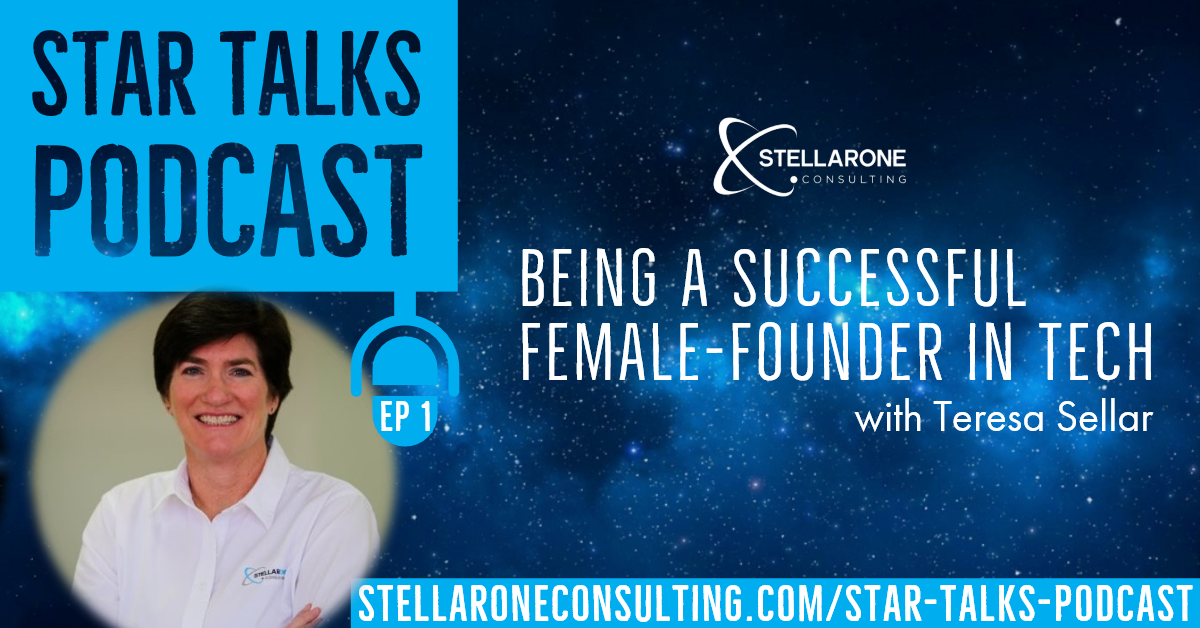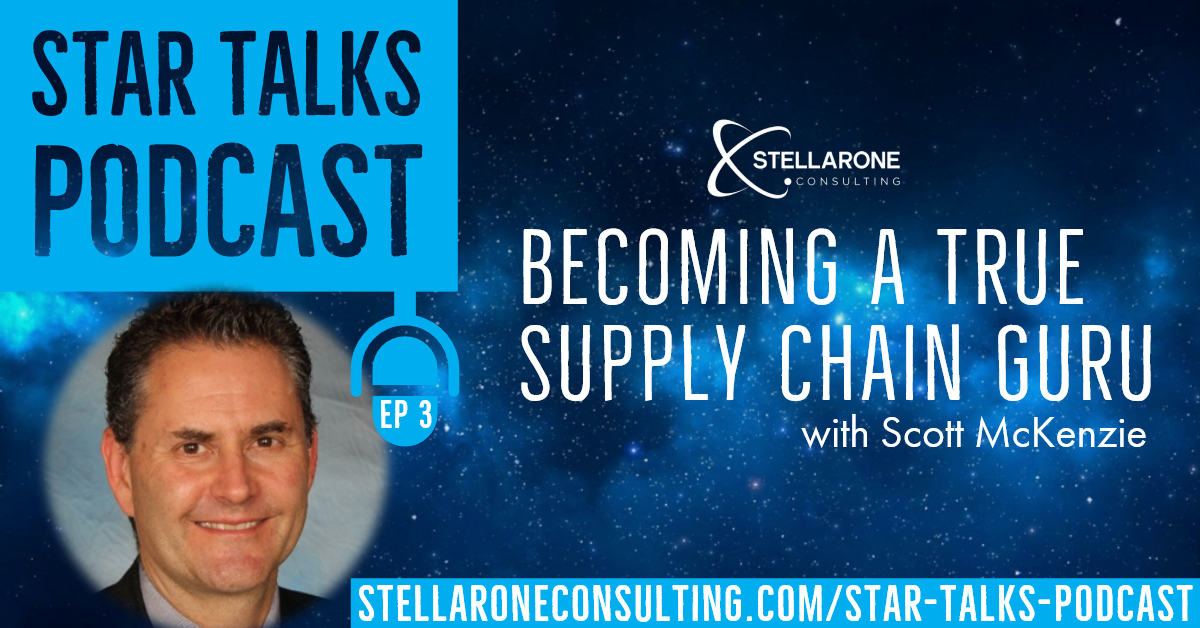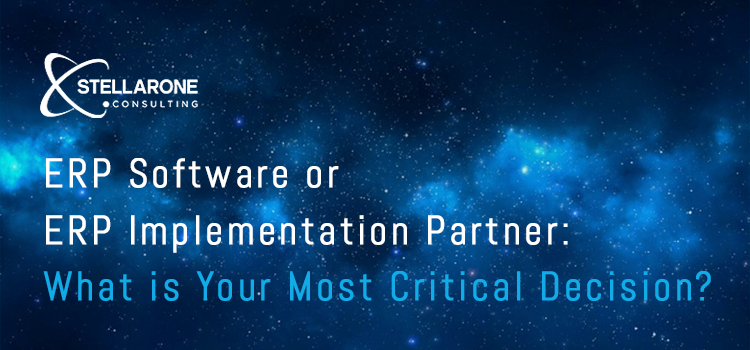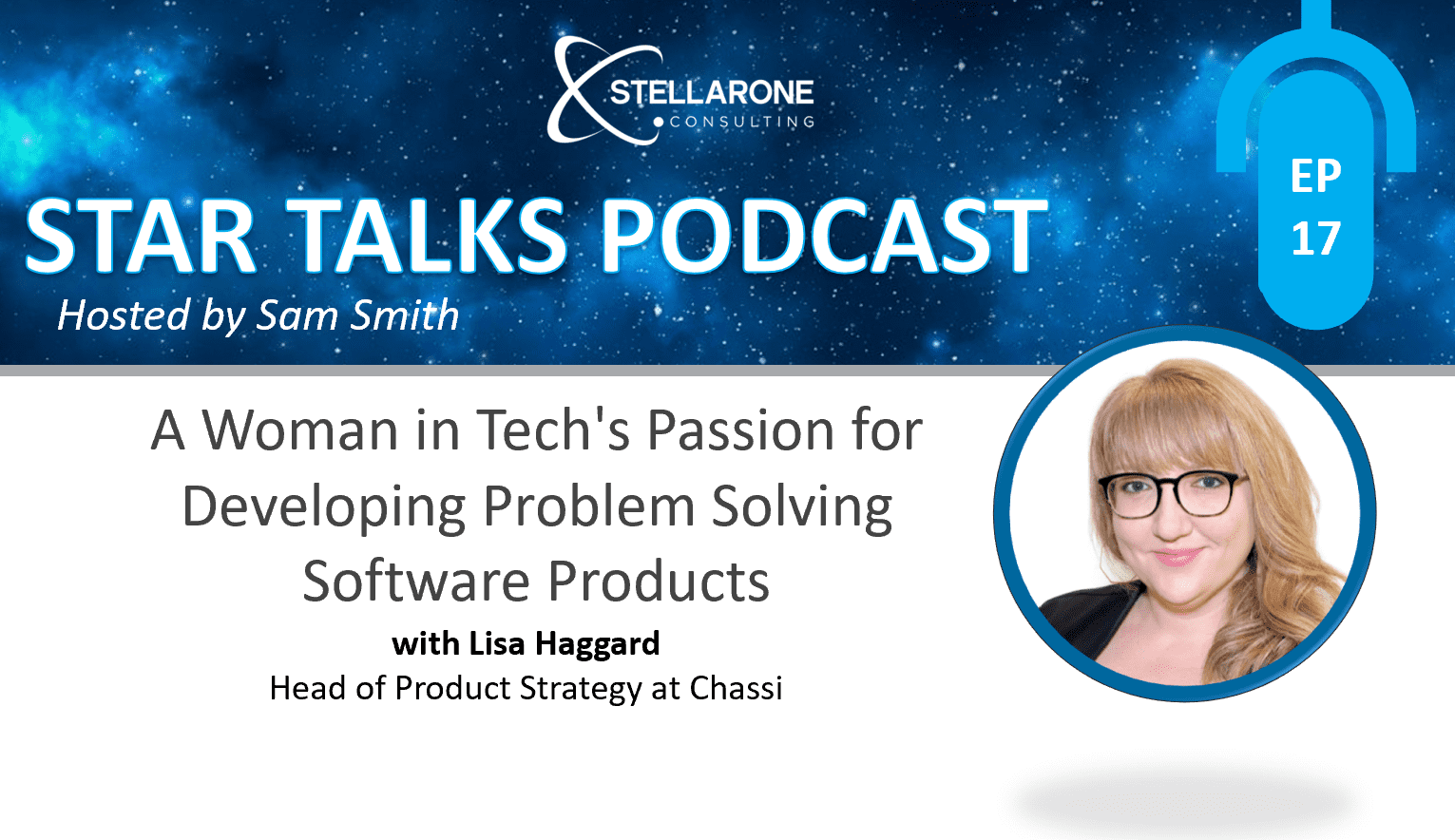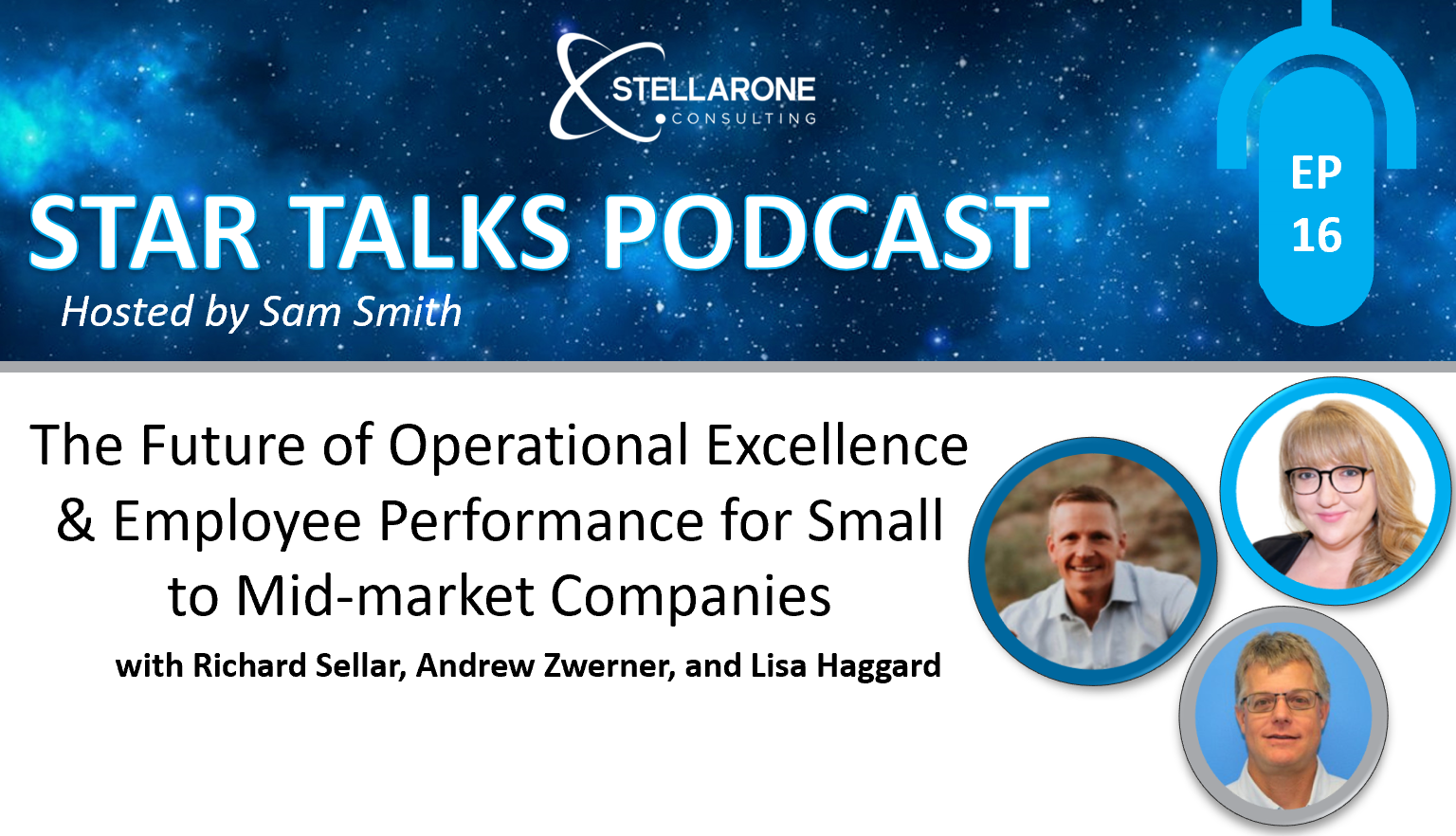Star Talks: Episode 2 with Richard Sellar: Star Talks is the podcast of small conversations that inspire you to do big things and on this episode Richard Sellar, former Head of IS at SpaceX, shares how business management technology has now turned science fiction into reality.
In this episode of Star Talks, Richard Sellar sits down with us to talk about how:
- He learned to lead a company by working with Elon Musk
- We are currently in the "2nd Renaissance of business management technology"
- Former science fiction is now a reality for small-and-medium sized companies
About Richard:
As an experienced consultant for various solutions, Richard has led development and improvement on custom Enterprise Resource Planning (ERP) systems. Since 2017, he has been President of Stellar One Consulting. Richard has developed deep roots with ERP and is passionate about data analytics and visualization, team and culture building, and improving the effectiveness of businesses.
Duration: 00:20:00 | Recorded: April 19th, 2019
Ways to connect with Richard and the Stellar One Team:
Richard Sellar - LinkedIn
Podcast Episode Links - Apple Podcasts | Google Play | SoundCloud | Stitcher | Spotify
See all Episodes here - Star Talks Podcast
Stellar One Consulting Social Media - Facebook | LinkedIn | Twitter
Here's the episode transcript:
Awesome. Thanks for being here, Richard.
Richard: (01:11)
Absolutely. My pleasure. Excited do this.
Take me back to a young Richard Seller. What was it like growing up?
Richard: (01:18)
I did a lot of things as a kid. I was definitely into sports and played a lot of roller hockey and anything with a ball, I get my hands on and get enough kids together. We would definitely be outside playing most of the time. But I also read a ton. I went through some series of books and I read them two or three times each too. So, uh, you know, when I had downtime I was definitely always doing something. It, there was no real, just sit back and relax, moving constantly.
So this is on the East coast?
Richard: (01:49)
Uh, East coast and in the South? Yeah.
Okay. So you're one of the more educated individuals that I've ever had the pleasure of working with. How many degrees do you have?
Richard: (01:59)
Uh, I have four degrees all in engineering. Uh, three of them are in aerospace engineering and one is mechanical engineering. What's weird is I never actually did work with any of those degrees, but they definitely applied to what I've done in my life.
Take us back to your first role out of college. What, uh, what were you doing?
Richard: (02:18)
So the first rule I guess I consider out of college when I finished my last degree, um, everything before that was kind of temporary. But, uh, what I started doing actually was ERP consulting, uh, manufacturing systems implementations on JD Edwards software. So, um, in the Midwest where I was at the time, there were a lot of manufacturing plants, there were a lot of opportunities to do consulting and do manufacturing implementation projects. That's really where I started learning ERP implementation. Uh, right after graduate school.
What was it like back then?
Richard: (02:52)
Different worlds. So we were, when I started the year I started the product, the JD Edwards product I was on was just transitioning from green screen, mid range computers to um, client server architecture. So applications sitting on a computer that you would interact with a database so closer to what we have today. Um, but it was a strange world because a lot of people were still hanging on to the green screen systems because they were faster for data entry. And back then everything was about data entry, right? There wasn't all those integration, there wasn't sucking orders in from an eCommerce site. It was pan keying everything, taking phone orders. So speed of data entry was a very important factor back then. Now it's a completely different world that we don't even think about that anymore.
You'd mentioned that you'd never used your engineering degrees. What led you to go into say aerospace engineering for example?
Richard: (03:49)
Um, I really loved math and physics. I started off my collegiate career as a chemical engineer and decided I didn't want anything to do with chemistry. So, um, I just, I really loved physics. I didn't want to be a mechanical engineer, just seemed a little too generic to me. Um, so I was always fascinated with airplanes. My father had a plane when I was a kid and I got to fly a little bit. So it just seemed like a natural place for me to end up.
One of the more interesting things, or one of the most interesting things I guess about your career is your time at space X. So what were you doing there?
Richard: (04:24)
At space X I was originally brought in just to help costs the first rocket, first three rockets. Um, they needed somebody who knew something about ERP systems and about product costing, which I had learned from my manufacturing implementation days, um, to help just come in and figure out how to use the system to get the data to put together a cost. Um, it turned out the system didn't have the data to support what we needed to do. So, um, based on my experience and, and the effort we went through to try and cost the rocket, and it was about a two month effort or so, um, they went to Elon and said, okay, we've got a cost, but we can't replicate this process. The data's missing. These are five things you need to do to, to get this moving in the right direction. And, and so I said, okay, well how about if we hire you and on full time I was doing it as a contractor initially and then, um, I hear you on full time and you're in charge of the system. So, um, that's how I got into running information systems to space X.
Very interesting. So, I mean, you mentioned Elon Musk, he's like a, a, a real life Tony Stark. How, how, what was it like working with him?
Richard: (05:32)
Elon's quite a character. Uh, he's definitely got his standards, but he's very clear about them as well. Some people don't necessarily like him, but he's not really a jerk. He's not trans, he's not. Um, he doesn't hide things. He's transparent about everything he does and he sets clear goals and expectations for people. And if you don't like that, then don't be there. Right. It's a, it's a choice we make and uh, but he's fascinating individual. Uh, he just is able to bounce from one topic to another effortlessly and be very smart about everything he talks about. It's incredible.
Were you working directly with him or were you, how was that relationship?
Richard: (06:14)
Yeah, when I first started at space X, I was meeting with them weekly and then we moved to every other week and then monthly after I got established. But yeah, it was a weekly meeting one-on-one. We had some of our key users in on and off depending on if they were available. But yeah, it was, it was me and him a lot.
So you lead a company now as you sort of got to watch him do. Do you, do you think that he shaped you in your way that you approach running and managing and leading and mentoring?
Richard: (06:41)
Absolutely. Yeah, there, there are a lot of lessons I took from my time at space X and from working directly with Elon, one of the things that I really grabbed onto and tried to do here at Stellar one is move fast. We tried to move as fast as we possibly can all the time without compromising quality. And you know, it's basics, it was safety. But here it would be, um, the integrity of the process and the integrity of what we're delivering to our customers. But it's that, and it's always looking for quantum leaps of improvement as well. So, uh, you know, a lot of companies will evolve slowly over time. We are looking to make major changes all the time because there's always a better way. There's always a different way of thinking. And so really focusing on how do we take that next quantum leap. A great example from space X was, uh, their first engines for the, well, one of the first sets of engines for their rockets was more than Merlin engines. And there was a point in time when they were about a hundred thousand pounds of thrust each and Elon told the VP of propulsion, okay, these need to be 140,000 pounds of thrust each. And some people would've just said, well, that's impossible. It's a 40% increase in power. But they were able to make that quantum leap because they thought a little, they, they forced them to think a little differently. So by setting those huge goals that really pushed people out of their comfort zone in their day to day, uh, just mechanical thinking about things and it makes them reevaluate what they're doing and really try to improve every day. So we, we try and do that here. That's one of the things I've definitely tried to carry over into this environment.
So it sounds like you were working a ton.
Richard: (08:16)
Yes. One of the philosophies at space X is Elon subscribes to the philosophy that it does take 10,000 hours to make somebody competent at their job. He just tries to cram that 10,000 hours into three years instead of five or two and a half years or two years. So the faster you can get to that level of experience and maturity and, and um, accomplishment and competence, the better off everybody is. So that's the other part. The other thing is with that too is just hiring, um, the smartest people right out of school that we could at space X because, uh, they weren't shaped by any preconceived notions of how things should be done. They just came out and said, okay, what's the problem I need to solve and here's a possible solution, not, Oh, we tried that 20 years ago and it doesn't work because things aren't the same now. They weren't 20 years ago. So it's just having that blank sheet of paper all the time and just learning as fast as we can and getting to point B as quickly as possible.
Now back to the show life after space X. What led you due to your eventual role as president of Stellar One Consulting?
Richard: (10:31)
Um, it was an interesting journey. It's not where I started off. Um, our founder Teresa was just started the company as an independent consultant and just kept getting busier and busier and so I took a leave of absence from a management consulting job to help her just establish some things, some internal systems. And, um, the goal is for me to spend about six months helping her get organized and hire somebody to help her and then go back to my management consulting job. And it turned out that there was too much work for me to leave and I could never really extract myself from, from Stellar One consulting. And at the time, uh, Teresa was the president and um, was uh, just a consultant but I guess VP of something, I guess it was like title if there was one. Um, and eventually Teresa she just wants to be a consultant. And so I stepped into the role. A lot of it had to do with, uh, me being able to kind of pull together information from a lot of different places and craft division for the company and have a clear plan on how to achieve that vision. So it just made sense for me to move into that role.
You have like this unique blend or synthesis of, you understand where technology is going and you understand systems, but you're also a true entrepreneur at heart. How do you balance those two things and how do those two things come into play at your role here at Stellar One?
Richard: (12:00)
I probably balanced less than I should. Um, I love new technologies. I love trying to build creative, fun, new things. So, uh, if it were up to me, we would just have a bunch of new stuff every week and it probably wouldn't work the way it should. It would work great for a prototype, but not for production. Um, but yeah, there is, there's that fine line right now that I have to walk where, and I'm always pushing us forward from a technology standpoint and a capability standpoint. But there's this, okay, we still have to make this an excellent experience for our customers. We can't forget that. So I really step out of my visionary role quite a bit to focus on process and how we deliver a great experience consistently on time every time. So I'd balance things out. Just a lot of that comes from my management consulting experience as well. So focusing on how to get things done, not just what to get done.
What excites you the most about where technology is? Where you're currently positioned? And what the market is demanding?
Richard: (13:08)
So we're right now, I see us in what I call the second Renaissance of ERP systems. So back in the early eighties or nineties maybe even a little before that, their accounting systems and they started growing into these more complex things, but when the '.com' boom happened in the Y2K bug or that software was only written, it really, especially in the HR side of things when it came to date, calculations didn't go past the year 2000 well there was this opportunity for companies to not just tweak their systems but to actually do some things that were creative with them. So the '.com' boom was this period of great creativity in terms of business models and, and there needed to be technology support those business models and certainly see that again now there's this confluence of, I think it's more technology driven now. So there's a confluence of great new technologies, artificial intelligence and natural language processing and blockchain and all these cool things, data visualization that are coming to fruition, things that we've been talking about for decades and they're really becoming a reality for small and medium size businesses.
Richard: (14:18)
So it's really exciting to see these things in people's grasp at a cost that is attainable. So we can start building really cool, innovative solutions for our customers. And there things that they have never thought about before or they're just almost science fiction at some point now their reality. Um, you know, things like, you know, we've always heard manufacturing companies talk about completely automating their factories and now it's such a big endeavor. It really isn't as big an endeavor now as it used to be. It's something that's achievable on a fairly reasonable budget now. So really fascinating things that are happening in the world. And, and what I'm trying to do right now is just make sure that we're positioned well to understand all of those and put those together in a meaningful way.
So put your, I guess as we all all commonly do here, put your yourself in the shoes of a C level executive at a small, medium size enterprises that maybe uses some legacy technology, they've got, you know, disconnected systems aside from you know, tactical sort of approach, the different things that you would do strategically, how should these companies be thinking and how should they be approaching quote unquote digital transformation?
Richard: (15:31)
Yeah, I think the hardest thing for, if I were sitting in their shoes, the hardest thing for me would be to really believe somebody who came up to me and said, Oh yeah, I can help you digitally transform your company and save you X dollars a year and automate all these processes and make your life simple and enable you to grow 10 times without adding a ton of people to do that. You know, people are still very skeptical and I understand that it's, it's really hard to trust and so, but once you can get past that, find the right partner and get to the point where you believe that that can be delivered. The really the key is freeing up your time and your energy to focus on helping your partner deliver that for you. Uh, it's really easy to get bogged down in the day to day things. It's really easy to hand off the implementation of your company's vision to somebody else because you know, there's a lot of hard work involved in it or it's just not in line with kind of the visionary things that a CEO might do or it's not, you know, it is not always in the core competence of the leaders running companies, but really embracing the technology and embracing the concepts and learning as much as possible along the way of implementing, um, that that would be my recommendation is definitely take that approach, get involved, understand what's happening. You don't have to understand it at a fundamental bits and bytes level, but at least conceptually, what is this going to do? What can it do? What other things could I possibly do with it? Is there are a lot of things out there that you as a business owner own pick up on that we as consultants don't see every day.
And so you talk a lot about the things that they can do in the way that they should be thinking. What do you think is the cost of not doing anything?
Richard: (17:21)
Um, there are companies that are going to come into the marketplace and throw everybody else into a tizzy because they are thinking differently. It's the, it's just like the new kids on the block, right? The people straight out of school who don't have any preconceived notions that we talked about earlier. There are people who will start companies that may know a little less about an industry than you, but know a ton more about technology and have an idea and run with it. Or they may be somebody who will work, people who aren't running companies before, but all of a sudden now, Ken, because they've got this idea of how to leverage what's going on in the world today to their advantage. And that's a big thing. There's going to be a lot of disruption in a lot of markets in the next 10 years or so. As we see AI take off and as we see big data and visualization and just having information for decision making right at your fingertips, the people that can really latch onto that and grasp it and and really embrace it are going to do really well and it may not be the established players.
What is the most rewarding thing? The thing that you love the most about what you do?
Richard: (18:36)
I like having an idea to improve our customer experience or help our customers run their business better and seeing that come to fruition. Seeing our customers really take that and run with it. Being able to deliver that idea to them in a way that helps them do something they weren't able to do before. That's what really gets me excited. It's, it's enabling these companies that have this great potential, enormous potential to do things that they never thought they could do, and having them come to the realization that, wow, now I've got the tools to do this and I'm going to start doing it and I'm going to go from this little tiny mom and pop operation to a real big substantial company that's got real management team and real revenue targets and everything else that are just dreams when you start out.
Well, this has been awesome, Richard. I really enjoyed it. Thanks for being here with us.
Richard: (19:32)
Absolutely. Thank you, Sam. I appreciate it.
If you'd like to suggest a guest, be a guest yourself, or if you have something you'd like to tell us, please send your message to StarTalks@StellarOneConsulting.com.

